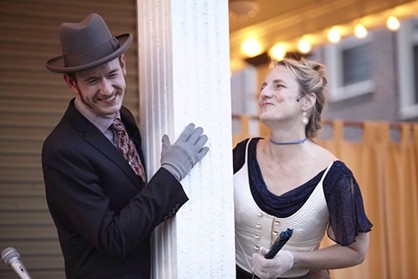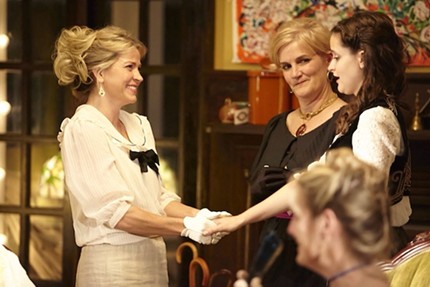Scanning the sometimes-scandalous text of Oscar Wilde’s A Woman of No Importance, you might wonder why it isn’t performed more often. The script isn’t as witty as The Importance of Being Earnest or as dramatic as Salome, but it artfully combines both of those elements. So we can be happy that PaperHouse Theatre has brought this provocative and pertinent work to us in such a creative fashion, staging their production at the Frock Shop on Central Avenue.

- George Hendricks Photography
By day, it may be a store with frocks and tchotchkes to peddle, but by night when PaperHouse takes over, the Frock Shop reverts to a characterful country home. Our hostess Lady Hunstanton’s maid and footman, Francis and Alice, lead us from the front lawn to a couple of indoor set-ups between acts. That’s the concept, anyway. Last Saturday night, tempestuous winds intervened and wrecked the opening lawn tableau. We were forced to pick up our choice of beverage on the porch and adjourn immediately to the parlor.
In that indoor terrace, the four-act scenario, punctuated with one brief intermission (with additional finger food and drink), unfolded at a leisurely pace. We didn’t see the title character until fairly deep into Act 2, after the title itself was intoned somewhat off-handedly by Lord Illingworth to end Act 1. Up to the moment that Mrs. Arbuthnot arrives, the most combustible conflict of the evening is a moderately heated dispute between American ingénue Hester Worsley and the more mature Britisher, Mrs. Allonby, over the relative merits of their native societies.
Allonby exemplifies the elegance, the worldliness, and the witty cynicism of her set, while Hester represents American egalitarianism, moral rigor, and sincerity. Some of the principles she espouses are also quite feminist. At first, it seems that Wilde’s sentiments tilt toward Allonby, for Hester — like her kindred spirit, Mrs. Arbuthnot — is as humorless as Shakespeare’s Malvolio, and she’s labeled a Puritan.
That tilt toward Allonby seems more pronounced with the presence of Lord Illingworth, who personifies the wicked wit of Wilde himself, spouting bon mots as readily as the playwright might at a suitably lavish dinner. “Nothing succeeds like excess,” he tells one of the ladies. “A man who can dominate a London dinner-table can dominate the world,” he boasts to his newly hired secretary, Gerald. Offering more fatherly advice, he says, “One should always be in love. That is the reason one should never marry.”

- George Hendricks Photography
As it turns out, Illingworth is Gerald’s father, though neither knew it when the hiring happened. While working for Illingworth will assure Gerald of a prosperous future, he doesn’t realize that his new boss ruined his mother in the past, refusing to marry her 20 years ago and refusing to acknowledge his newborn son. So the conflict between Mrs. Arbuthnot and Lord Illingworth very much parallels the one between Hester and Allonby. Arbuthnot doesn’t want her son to leave her home for Illingworth’s employ, but Gerald (still unaware of his lineage) and his father are equally eager to cement their new relationship.
Illingworth’s urbanity and the pragmatic benefits of all he has to offer seem to outweigh Arbuthnot’s misgivings, although we quickly discern, via epigrams like those quoted above, that George’s influence on his son Gerald could be a corrupting one. What, then, might shift the balance in Mom’s favor? Let me just say that there’s a challenge between Illingworth and Allonby whose terms are similar to those that ignite the decadence of Les Liaisons Dangereuses.
The performances are almost uniformly superb, their naturalness enhanced by the fact that we’re hearing them in stylish spaces that don’t merely simulate Wilde’s settings. But I could see why critics might carp at the play and why companies might hesitate to stage it, despite its abundant wit and humanity. Secondary characters developed in rich detail in the opening acts seem to evaporate without any kind of resolution at the end. Once Wilde has employed them to sketch the milieu he satirizes, he appears to lose interest — very much to the playwright’s point in assessing the upper crust’s true worth, perhaps, but not terribly consoling to maybe eight of the actors who must idle away offstage until the final telling line before taking their bows.
Brianna Susan Smith and Chaz Pofahl are delightful as the priggish, controlling, and jealous Lady Caroline and her long-suffering husband, Sir John Pontefract, who does his mischievous utmost to earn milady’s jealousy whenever he can escape her clutches. But it’s toodle-oo to them all too soon. Same applies to the budding dalliances between Andrea King as Lady Stutfield and Luke Borgnis as the eligible MP, Mr. Kelvil.
On the other hand, the departure of Sidney Horton as the most officious and ceremonious Archdeacon Daubeny is most gratifying and cannot come too soon. Pam Coble Coffman as our hostess is even more wholesome, genial and blockheaded, yet she lingers like an infected sore well into Act 4 before we’re rid of her. The most absurd of the ladies are Smith as Lady Caroline and Shawnna Pledger as Mrs. Allonby, and certainly the vintage costumes supplied by Caroline Cook-Frers — owner of the Frock Shop — substantially enhances their pomposity.
But it’s Pledger who gets to joust with Illingworth as Allonby, providing a sexual edge and a guilty pleasure that the Illingworth-Arbuthnot confrontations don’t deliver. Grant Watkins has proven repeatedly over the past three years that he can be any kind of cad or libertine a script demands, but here as Lord Illingworth he also dons an aristocratic accent — and dress gloves — with panache, arguably surpassing even himself.
In her maiden outing as a director, Kim Parati is nearly as successful with the virtuous folk as the baddies. Her only mistake is with Frances Dell Bendert as Mrs. Arbuthnot, apparently a film actress to the bone. Bendert completely conquered her interiorizing tendencies until we reached her heart-to-heart talk with her son Gerald in Act 4, when instinct took over and she was inaudible to those of us further back than the first row. Placing mother and son further apart probably would have goaded Bendert to pump up the volume, but the denouement with Illingworth was yet to come, where Bendert was as perfect as Watkins. The timing of their climactic clash was breathtaking.
After star turns at Children’s Theatre this spring, Katy in Lilly’s Purple Plastic Purse and Chester in Jackie & Me, Katy and Chester Shepherd clicked predictably as Hester and Gerald in lovebird roles that could easily grow stale in less vibrant hands.
They aren’t the center of attention by any means, but considering all that Mrs. Arbuthnot has sacrificed in the past — and all she is still ready to sacrifice — they become the heart of her story. Trading ripostes with Allonby, Katy gives us our first inkling of how strong and courageous women can be. Volleyed back and forth between his parents during the middle acts, Chester is particularly effective in underscoring how important No Importance truly is.
